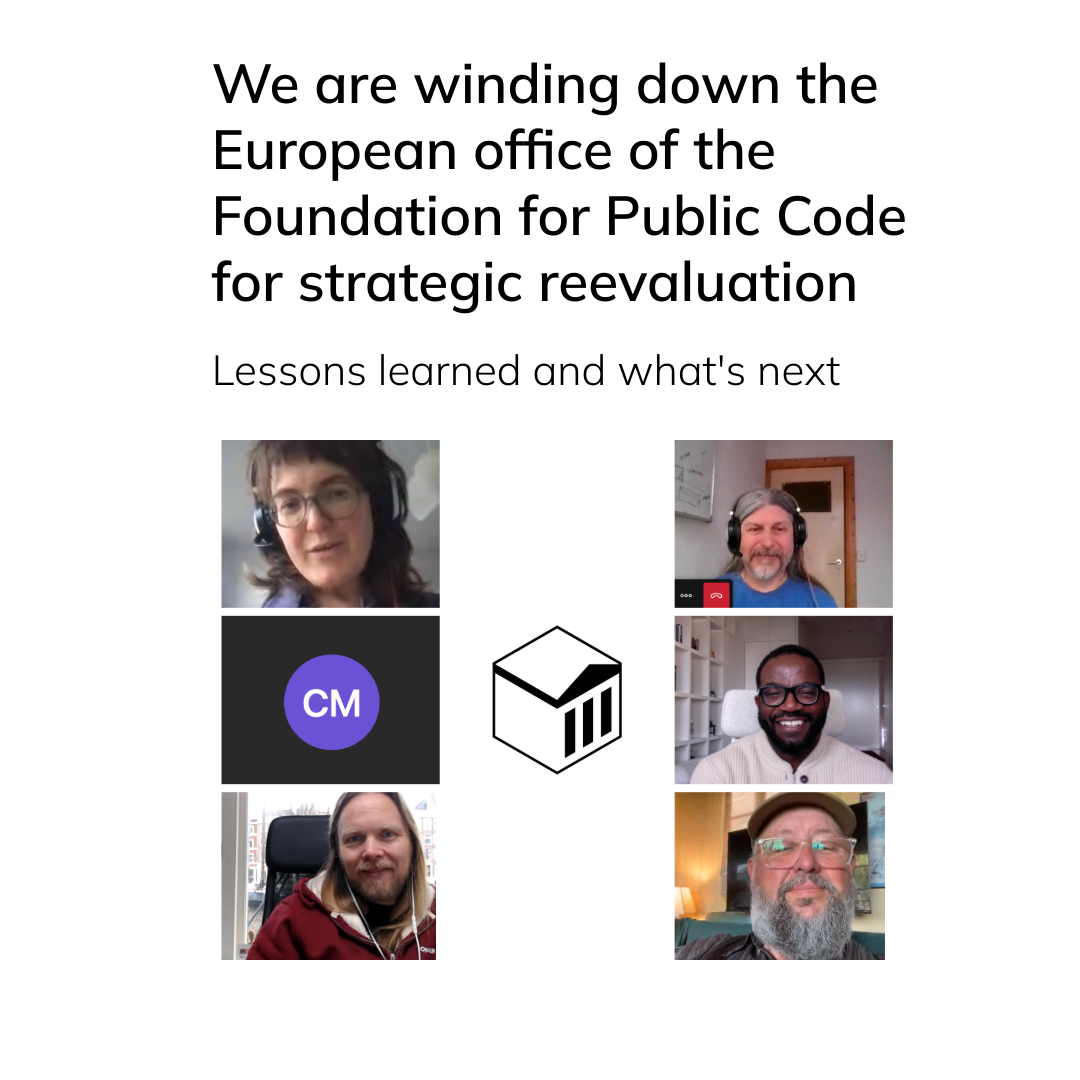Changes at the Foundation for Public Code Europe office
We are winding down the current composition of the European office of the Foundation for Public Code, because our existing financial model has not proved to be sustainable.
All of the full-time staff associated with our European office are being laid off. We are extremely grateful for their contributions and look forward to potentially working with them in other capacities in the future.
The North American chapter of the Foundation for Public Code will continue to move forward with an expanding set of project-based initiatives and collaborations with public administrations. Additionally, the Foundation will continue to participate in policy conversations around the growing ecosystem of codebase stewardship organizations at the European level.
Challenges along the way
We had initially built our organizational structure following a Linux Foundation model, including having the capacity to steward codebases and communities within our organization. We asked public administrations to become members of our association, becoming part owners of the Foundation which would function as an external entity that worked closely with internal departments to create sustainable codebases through modern software practices and communities of practice. Thanks specifically to Provincie Zuid-Holland in the Netherlands for becoming our first official member! And to the public sector codebase communities who were eager to meet the Standard and enter into stewardship with us. And to everyone we met along the way who told us this was forward-thinking and necessary.
But despite the enthusiasm and support we encountered, that approach has not worked. Our membership model was not viable. Participation as a member in this type of association was too risky for public administrations. They could not afford to be part owner of an entity which they did not have sufficient control over. Additionally, as we began to work internationally, it became clear that non-Dutch public administrations could not legally even join as a member a body governed by rules of a state outside of their own sovereign jurisdiction. As these limitations became more defined, we attempted to transform our financial and governance models, but we weren’t fast enough to achieve sustainability for our full team. We also dedicated substantial energy to raising funds via institutional philanthropy, but much of this funding is focused on specific causes, rather than on capacity building and process transformation in the public sector.
Of course the pandemic did not help. Many of the government technology teams we were initially working with rightly refocused on rapidly developing responses to devastating national public health crises and damaged national economies, without much bandwidth to think about the longer term issues that stewardship practices represent.
Maturing public sector open source ecosystem
There are also some quite positive reasons why it makes sense for us to adjust the composition of the Foundation for Public Code. The perspective in public administrations toward taking active responsibility in procuring and stewarding their own digital projects has evolved faster than we initially anticipated. There is now a growing movement among European governments toward creating an Open Source Program Office within their organizations, which is a strategy we have long advocated for globally and championed among our members and partners. We are a proud founding member of the OSPO Alliance and have worked with OSPO++ on projects in the European Commission and the United Nations. One of our co-founders has even gone on to become the founder of the first OSPO at a Dutch national ministry. As these initiatives internal to government become more resourced and develop capacity, it is less necessary for the Foundation for Public Code to develop external networks within the open source community on behalf of once insular public organizations.
Looking to the future
The North American chapter of the Foundation will continue to engage with the multiple projects and communities of practice it is moving forward, and participate in the developing policy discourse there.
In the European policy context, the Foundation will continue to be involved in multiple conversations and working groups at the European level and in multi-stakeholder frameworks focused on the creation and sustainable development of Open Source Program Office capabilities and the creation of non-profit organizational vehicles for collaboration around digital public goods. We will continue our collaboration with the Digital Public Goods Alliance, Open Futures, and Open Forum Europe, among others. Our Advisory Board will continue to provide strategic guidance.
Based on potential forthcoming grant-based project awards, the Foundation will continue to collaborate with our network of trusted experts on projects towards building capacity in the public sector and creating codebase governance and stewardship organizational structures for digital public goods.
We’re also working to build a distributed community of practice for the Standard for Public Code. We hope to support and assist this network of maintainers and other experts in shepherding the Standard to 1.0, in line with the goal agreed in recent community calls.
The Foundation for Public Code’s role in the ecosystem of digital public goods must evolve. We have worked hard on moving the awareness and practice of codebase stewardship and governance forward and have seen positive results. There will be more news about this transformation in our future posts, but for now we would like to honor the enormous contributions and efforts of the collection of talented and hard-working individuals that are the outgoing employees of the European office of the Foundation for Public Code.

Thank you so much Claus, Elena, Eric, Jan, and Kehinde.
Ben Cerveny,
President